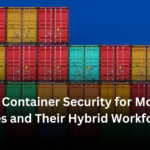While the pandemic has taken over and the new norms of business operations have completely changed over the past few months, companies across all industries have realized that it is imperative to protect their data especially during these times when most of the employees are working remotely.
Although remote working has been a business-saver during these times, telecommunicating has become a huge challenge. Unlike before where working from the office was the norm, employees now are connected and working through multiple devices, networks and capacities. Managing data security and keeping business operations running is a hot topic for most of the companies.
So, here are the 3 ways of securing your business data if your company is facing the same challenge:
1. Establish A Cybersecurity Policy
In a study by Quickstart.com, they mention 90% of the cybersecurity professionals think that vulnerabilities occur due to insider threats. This is mainly due to the lack of training and awareness from companies that leads to mismanaging of business data.
Even though most companies have internal policies defining how to protect business data, most employees wouldn’t be aware of the importance of it. So, constant training has to be carried by the companies to educate all their employees (including their top management) on how to protect, share and handle business assets.
With the rising threats in the digital world and especially during these times, companies and business owners need to take this up as an ongoing activity. This can be a simple event like video conference, monthly meeting or a training session hosted by IT our Cybersecurity team.
2. Have an asset management tool
Unauthorized and unnecessary access to business data, even to employees can be a very dangerous conundrum for businesses. While business data has to be shared with employees for the functioning of your business, there are many cases where companies have suffered devastating circumstances when access is not restricted within the circles of stakeholders.
Managing all the assets manually can be a huge challenge even for small companies because of the tendency of digital data which grows exponentially. In these cases, using an asset management tool can be very handy.
With the right infrastructure and setup, these tools help in controlling the access easily while providing accessibility and flexibility for the asset owners. This will work even to an extent where the devices, perimeter and users can be assigned for every file or application.
3. Protect Company Emails From Fraudsters and Phishing
One of biggest cyberthreats to a business is data leak through emails. A report from PhishMe highlighted that employees continue to be vulnerable to phishing attacks with the response rate of 20% and above. This rate is increasing day by day and many companies including large corporations have been victims for these threats.
Since emails are common and most widely used means of communication in any company, it is very easy to target employees for the fraudsters. While they might be victimizing the employees, they might come across the organization’s sensitive data which can be misused.
In order to protect the emails from fraudsters and phishing, it is must for every business to have proper protection and setup. This can be achieved with email server protection tools which will help in securing, password-protecting and spam control.
Protecting business data has become more important than ever! Being in the condition where the new norm for employees is to work remotely, every company needs to act and recoup their security strategy to ensure their asset protection.
If you are in the market for a Data Access & Enterprise Security Platform, you can get in touch with our experts or sign up for a free demo of CACHATTO.





